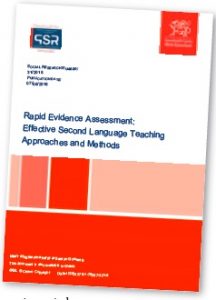CLIL is not a methodology says Jason Skeet of NILE in Norwich
As CLIL trainers, we were asked to look at the research on CLIL included in the Welsh Rapid Evidence Assessment report on second language learning (see page 18).
Our first observation concerns the purpose of the report. It is a research review of second-language teaching approaches and methods, which raises a fundamental question for us about the inclusion of CLIL.
Someone unfamiliar with the field might be forgiven for thinking that CLIL is a second language teaching approach. But it is not just about language learning – it’s also about learning a subject. Indeed, CLIL is first and foremost an approach to bilingual education, and this must be kept in mind in any evaluation of its effectiveness.
In fact, a key characteristic (without getting into a discussion of ‘hard’ versus ‘soft’ versions) is that learning is driven by the subject content, while language is the vehicle for this learning. This idea is perhaps best captured in David Marsh’s well-known formulation: ‘using language to learn and learning to use language’.
A problem for any systematic review of research – and also for meta-analyses – arises when comparing research across different contexts, with differing variables. For example, the intensity and duration of different interventions will account for some of the differences in results.
The authors of the report do acknowledge this issue. In their summary of general language competence findings, they point out the difficultly of comparisons between CLIL and non-CLIL groups, since the former receive a greater exposure to the target language. In fact, this greater exposure is precisely one of the benefits of CLIL which, by the way, does not involve replacing language lessons (one of the great misconceptions).
Other summary findings can also be related to CLIL, in our experience, although the authors do not make this connection: it can be said to provide learners with meaningful interaction, exposes learners to authentic materials and increases learners’ motivation to learn.

As CLIL specialists, we need more research from a wider range of contexts – for example, in this review a great deal of the research on CLIL is based on Spain. While this does reflect the existing research field, it should be noted that within the listing of research excluded from the review, there are examples of interesting and valuable research studies conducted in other contexts, such as the Netherlands.
The review reflects how much of the existing research has been conducted in an applied linguistics context; we would like to see the research field for CLIL broaden, with more research on the impact of learning subject content. We would also like to know more about subject-specific methodology: what particular domain or subject-specific teaching approaches and methods are effective in developing learners’ cognitive, procedural and linguistic competences in that domain/subject?
“CLIL is first and foremost an approach to bilingual education, and this must be kept in mind in any evaluation of its effectiveness.”
On this point, we would also like to see more practitioner-led and inquiry-based research, focusing on addressing immediate and context-specific problems.
The summary of findings in the report also acknowledges the need to support teachers with training and development in CLIL. In NILE’s experience, working in a number of different national contexts, this is indeed crucial. As such, we would only wish to add that any planning for training and professional development must consider how to give teachers ownership over this process, as well as empower teachers to try out in their classrooms, what might be new approaches and methods to teaching and learning.





